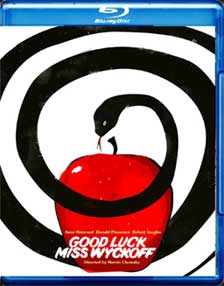 GOOD
LUCK, MISS WYCKOFF (1979) (Blu-ray/DVD combo)
GOOD
LUCK, MISS WYCKOFF (1979) (Blu-ray/DVD combo)Director: Marvin Chomsky
Vinegar Syndrome
 GOOD
LUCK, MISS WYCKOFF (1979) (Blu-ray/DVD combo)
GOOD
LUCK, MISS WYCKOFF (1979) (Blu-ray/DVD combo)Like its heroine, Marvin Chomsky’s screen adaptation of William Inge’s novel GOOD LUCK, MISS WYCKOFF is also nearing thirty fire years of age, and Vinegar Syndrome has revitalized it with a 2K high definition restoration and a three-disc Blu-ray/DVD combo special edition.
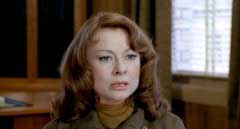
Thirty-five year old Freedom, Kansas college Latin teacher Evelyn Wyckoff (Anne Heywood, THE NUN AND THE DEVIL) has become more sensitive of late. She’s having trouble sleeping and suffers from bouts of uncontrollable crying, including some embarrassing moments in public. Her doctor (Robert Vaughn, TV’s THE MAN FROM U.N.C.L.E.) believes she is undergoing early menopause and – despite claiming to the contrary – pretty much suggests that “if you don’t use it, you’ll lose it”. He recommends her to Dr. Steiner (Donald Pleasance, HALLOWEEN), a psychotherapist in Wichita who helps her address her fears about sex. A flirtation with the married bus driver Ed (Earl Holliman, SUMMER AND SMOKE) of her weekly trek from Freedom to Wichita also emboldens her in other areas of her life, including the spirited defense of a history teacher (J. Patrick McNamara, BLOW OUT) suspected of being a communist sympathizer (and possibly “queer” as well). Evelyn decides to have an affair with Ed only to discover that he has quit his job and skipped out on his wife and kid as well. Rather than feeling rejected, she is happy to have taken the decision into her own hands. She resists an aggressive advance from black student Rafe (John Lafayette, NEON MANAICS) – working as a janitor as part of his scholarship – but tells no one out of concern for his education and her own reputation. The next day after class, however, he rapes her and she stays silent (after having been unable to even get through to Dr. Steiner). Rafe continues to taunt her and sexually dominate her until she convinces herself that the relationship is something akin to love; however, she soon realizes that Rafe has no more respect for her than he does for any other white person, and she will be the one to bear the shame when the affair comes to light.
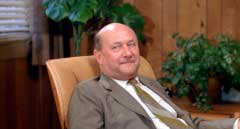 Although
Inge’s 1970 book was more contemporary in its publication and (relatively)
in its setting than Kyle Onstott’s “Falconhurst” series of
novels (1957-1973), one can assume that Marvin Chomsky’s screen adaptation
– adapted by Polly Platt (PRETTY BABY) – was mounted in the wake
of the Dino De Laurentis’ big screen versions of Onstott’s MANDINGO
(1975) and DRUM (1976). That said, the interracial aspect of the relationship
between Evelyn and Rafe (in all its aspects) is not the focus of GOOD LUCK,
MISS WYCKOFF (although the production must surely have been courting the same
controversy with the graphic rape and sex scenes); rather, it is her “rebirth”
which begins well before the rape. The “take a lover” solution to
Evelyn’s problems is more reflective of the state of medicine and psychiatry
at the time than the book or the film’s viewpoint; and the Dr. Steiner
character recognizes that Evelyn “might” be going through early
menopause, but she is a lonely woman not a sexually-frustrated virgin, and that
her issues with emotional intimacy are the ones that need to be addressed more
so than the physical. As Evelyn herself says, the climax of the story was inevitable,
but neither the story fortunately does not take the easy way out.
Although
Inge’s 1970 book was more contemporary in its publication and (relatively)
in its setting than Kyle Onstott’s “Falconhurst” series of
novels (1957-1973), one can assume that Marvin Chomsky’s screen adaptation
– adapted by Polly Platt (PRETTY BABY) – was mounted in the wake
of the Dino De Laurentis’ big screen versions of Onstott’s MANDINGO
(1975) and DRUM (1976). That said, the interracial aspect of the relationship
between Evelyn and Rafe (in all its aspects) is not the focus of GOOD LUCK,
MISS WYCKOFF (although the production must surely have been courting the same
controversy with the graphic rape and sex scenes); rather, it is her “rebirth”
which begins well before the rape. The “take a lover” solution to
Evelyn’s problems is more reflective of the state of medicine and psychiatry
at the time than the book or the film’s viewpoint; and the Dr. Steiner
character recognizes that Evelyn “might” be going through early
menopause, but she is a lonely woman not a sexually-frustrated virgin, and that
her issues with emotional intimacy are the ones that need to be addressed more
so than the physical. As Evelyn herself says, the climax of the story was inevitable,
but neither the story fortunately does not take the easy way out.
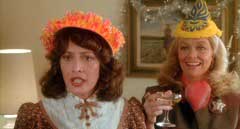
Heywood had married the film’s producer Raymond Struss in 1979, but they had worked together as early as 1962 with the Freddie Francis film THE BRAIN as well as the more notable and controversy-courting ventures THE FOX – based on the novel by D.H. Lawrence – and I WANT WHAT I WANT (1972) in which Heywood plays a young man who decides to live as a woman. Carolyn Jones (THE ADDAMS FAMILY) plays Evelyn’s fellow teacher and best friend Beth, and the other teachers include Doris Roberts (TV’s EVERYBODY LOVES RAYMOND), Ronee Blakely (A NIGHTMARE ON ELM STREET), and Dorothy Malone (TV’s PEYTON PLACE), and Dana Elcar (TV’s DARK SHADOWS) plays the school’s principal. Evelyn’s landlady was played by Jocelyn Brando (THE BIG HEAT) – Marlon’s older sister – and her husband by R.G. Armstrong (THE BEAST WITHIN). For such an interesting cast, it seems as if only Heywood and Holliman - who manages to make his character more charming than sleazy even as he admits that he's unfaithful to his wife - are actually given enough material to shine (with Jones a runner up, and a reigned-in Pleasance as the film's voice of reason). Film Ventures’ in-house composer/music supervisor Igo Kantor served here as the film’s production manager (although the film went out through Cinerama, the same company that had released I WANT WHAT I WANT).
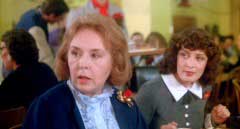 GOOD
LUCK, MISS WYCKOFF has been mastered in 2K from the original camera negative,
and Vinegar Syndrome’s 1080p24 MPEG-4 AVC-encoded widescreen (1.85:1)
Blu-ray (and 16:9 DVD) looks almost pristine, with the occasional coarsening
of the image during opticals as much a reminder as Miss Heywood’s close-ups
and her Vaseline-lensed lingerie fantasy that the cast and crew aspired to something
classier and more old-fashioned than Cinerama’s advertising would suggest.
The mono audio – DTS-HD Master Audio 2.0 on the Blu and Dolby Digital
2.0 on the DVD – is not as clean, with occasional noise that may point
to the places in which the image might have undergone heavier digital clean-up.
A first for Vinegar Syndrome here is the inclusion of English SDH subtitles
on both the Blu-ray and DVD for the feature, but they can only be selected from
your remote since there is not menu set-up option. The subtitles are sport a
number of inaccuracies like “I’m gonna level with you” transcribed
as “I’m going to have a little word with you”, “I only
likes football” becomes “Don’t really like football”,
“Junior here wants some attention” becomes “Junior here wants
to lower the tension”, and “I’ll leave you my geranium”
becomes “I’ll leave you my terrarium”. The subtitle option
is a nice choice, but should be more carefully done the next time around (presumably
this will only be an option on the Blu-ray/DVD combos and not the Drive-in Collection
releases). It’s a very respectable presentation of a film that seems to
have gotten a half-hearted promotion by Cinerama before being dumped a year
later onto smaller distributor IFI/Scope III (a short-lived company that also
released BEYOND EVIL, GRADUATION DAY, and LADY STREETFIGHTER) who released it
in a completely gutted version titled THE SIN.
GOOD
LUCK, MISS WYCKOFF has been mastered in 2K from the original camera negative,
and Vinegar Syndrome’s 1080p24 MPEG-4 AVC-encoded widescreen (1.85:1)
Blu-ray (and 16:9 DVD) looks almost pristine, with the occasional coarsening
of the image during opticals as much a reminder as Miss Heywood’s close-ups
and her Vaseline-lensed lingerie fantasy that the cast and crew aspired to something
classier and more old-fashioned than Cinerama’s advertising would suggest.
The mono audio – DTS-HD Master Audio 2.0 on the Blu and Dolby Digital
2.0 on the DVD – is not as clean, with occasional noise that may point
to the places in which the image might have undergone heavier digital clean-up.
A first for Vinegar Syndrome here is the inclusion of English SDH subtitles
on both the Blu-ray and DVD for the feature, but they can only be selected from
your remote since there is not menu set-up option. The subtitles are sport a
number of inaccuracies like “I’m gonna level with you” transcribed
as “I’m going to have a little word with you”, “I only
likes football” becomes “Don’t really like football”,
“Junior here wants some attention” becomes “Junior here wants
to lower the tension”, and “I’ll leave you my geranium”
becomes “I’ll leave you my terrarium”. The subtitle option
is a nice choice, but should be more carefully done the next time around (presumably
this will only be an option on the Blu-ray/DVD combos and not the Drive-in Collection
releases). It’s a very respectable presentation of a film that seems to
have gotten a half-hearted promotion by Cinerama before being dumped a year
later onto smaller distributor IFI/Scope III (a short-lived company that also
released BEYOND EVIL, GRADUATION DAY, and LADY STREETFIGHTER) who released it
in a completely gutted version titled THE SIN.
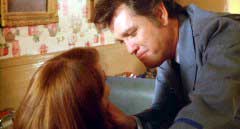
THE SIN (79:54) is presented here – along with the sets other extras on the DVD half of the combo (which also includes an SD version of GOOD LUCK, MISS WYCKOFF). I’m going to presume that it’s a reconstruction of the cut version using the 2K master for the original since framing is identical and image quality is comparable. Pretty much the only reason to watch this alternate version is to see the effect of the removal of roughly twenty-eight minutes. The deletions include:
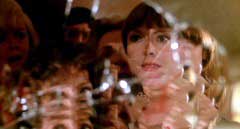 *
The first school scenes in which Evelyn tells Beth she slept poorly after seeing
A STREETCAR NAMED DESIRE the night before, the first Latin class scene in which
she becomes distracted while recalling her visit to Mount Vesuvius), and the
school assembly in which starts uncontrollably crying during a piano recital
(approx. 7 ½ minutes);
*
The first school scenes in which Evelyn tells Beth she slept poorly after seeing
A STREETCAR NAMED DESIRE the night before, the first Latin class scene in which
she becomes distracted while recalling her visit to Mount Vesuvius), and the
school assembly in which starts uncontrollably crying during a piano recital
(approx. 7 ½ minutes);
* Evelyn calling for a doctor’s appointment and the first half of the
exam (approx. 1 ½ minutes);
* Evelyn’s session with Dr. Steiner after learning that Ed has quit his
job and skipped out on his wife, followed by her meeting with the principal
about public pressure to fire Rawlins, Evelyn’s entire stirring PTA speech,
Evelyn finding Chester hiding in one of the classrooms, and Evelyn returning
home and overhearing her landlady’s concerns that she might be a communist
(approx. 6 ½ minutes);
* the middle section of the tape scene so that it cuts from Rafe unzipping his
jumpsuit to Evelyn lying on the desk crying, and inserting a nonsensical cutaway
to Evelyn’s boarding house in between despite the fact that they are in
the classroom (approx. 3 minutes);
* the third sex scene in which Rafe demands Evelyn crawl to him and beg, cutting
from him unzipping his jumpsuit again to Evelyn having lunch at school the next
day (approx. 3 ½ minutes);
* the second half of the scene of the janitors gossiping about Rafe and Evelyn
being alone together, the scene in which they witness Rafe’s attack, Evelyn
tending to her wounds at home, and a few scenes of her realizing that she is
being shunned by Beth at school the next day (approx. 3 ½ minutes);
* and the last cut removes a shot of Evelyn leaving the school – which
features the plaque with the Emerson quote seen in the first removed bit as
well – and an awkward visit with her doctor for a sleeping pill prescription
(approx. 3 ½ minutes)

Most of the cuts, including the removal of the communist subplot, appear at first to have been performed to speed up the narrative to the salacious bits. Then, however, most of the brutality of the rape scene is removed (we seem him being forceful and her crying afterwards). The second more tender sex scene is preserved, but the third and fourth sex/rape scenes also cut the more brutal aspects of Rafe’s character (other than some dialogue in another scene). In fact, the removal of the fourth one suggests that idle gossip spurns the events of the final fifteen minutes of the film; and these cuts also has an effect on the level of outrage the audience should be feeling since they suggest a reaction to rumors of an interracial affair rather than an account that vilifies Evelyn and dismisses Rafe’s brutality and her suffering. These cuts also grossly simplify the complexity of Evelyn’s reactions and motivations. Robert Vaughn and Donald Pleasance also lose a chunk of their screen time. The reissue trailer pretty much says it about this version, asking “How long can a woman stand being a virgin?” and describing Heywood’s character as "pushed to the limit, and into committing THE SIN!” (although even the original version’s trailer glosses over the interracial aspect).
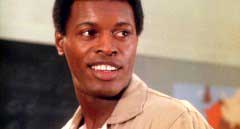 Disc
two also includes an interview with actress Shirley Knight (6:37), which is
a remote interview introduced by the film’s producer Robert Weinbach (CAULDRON
OF BLOOD). Knight wasn’t in the film, but her interview focuses on her
memories of source novel author William Inge. Knight’s first film role
was as an uncredited extra in the Inge play adaptation PICNIC (1955), and her
first major feature role was in another Inge play adaptation THE DARK AT THE
TOP OF THE STAIRS (1960). She also helped found the William Inge Theatre Festival.
Knight describes the themes Inge explored in his plays, and reads an excerpt
from the LIFE magazine review of the book GOOD LUCK, MISS WYCKOFF. Also thoughtfully
included are trailers for both the original version and the reissue (5:27),
two television spots for the original and one for the reissue (2:04), as well
as a still gallery. GOOD LUCK, MISS WYCKOFF is also Vinegar Syndrome’s
first three-disc set, and the first to include a soundtrack CD for Ernest Gold’s
score with seventeen unlabeled tracks (30:32). (Eric
Cotenas)
Disc
two also includes an interview with actress Shirley Knight (6:37), which is
a remote interview introduced by the film’s producer Robert Weinbach (CAULDRON
OF BLOOD). Knight wasn’t in the film, but her interview focuses on her
memories of source novel author William Inge. Knight’s first film role
was as an uncredited extra in the Inge play adaptation PICNIC (1955), and her
first major feature role was in another Inge play adaptation THE DARK AT THE
TOP OF THE STAIRS (1960). She also helped found the William Inge Theatre Festival.
Knight describes the themes Inge explored in his plays, and reads an excerpt
from the LIFE magazine review of the book GOOD LUCK, MISS WYCKOFF. Also thoughtfully
included are trailers for both the original version and the reissue (5:27),
two television spots for the original and one for the reissue (2:04), as well
as a still gallery. GOOD LUCK, MISS WYCKOFF is also Vinegar Syndrome’s
first three-disc set, and the first to include a soundtrack CD for Ernest Gold’s
score with seventeen unlabeled tracks (30:32). (Eric
Cotenas)